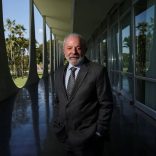Angola: TAAG to start flights to Nairobi in September
Angola: Isabel dos Santos arrest warrant questioned as parliament debates amnesty bill

File photo: Lusa
Angolan lawyer and university professor, Benja Satula, on Monday questioned the logic behind the issuing of an international arrest warrant against Angolan businesswoman, Isabel dos Santos, when a draft amnesty law is under discussion in parliament.
Benja Satula was speaking to Lusa about the recent international arrest warrant against Angolan businesswoman, Isabel dos Santos, on the sidelines of the national conference of the national union of public prosecutors, where he was one of the speakers.
For the lawyer, there are other ways of solving this problem, arguing that there is “a slightly distorted criminal policy approach”.
“Because, at the same time that you are taking an amnesty bill to parliament, at the same time, an international arrest warrant is being issued against a citizen. From the point of view of the dogmatic rationality of criminal policy, these are things that do not go together and for this very reason I cannot understand the logic, the rationality and the effectiveness”, he stressed.
According to the lecturer, society need not be euphoric, “because the public prosecutor’s office has already issued other [international arrest warrants] and has not managed to bring anyone in”.
“Precisely because the logic, the reading that is made of the public prosecutor’s office and its structure in Angola, is a structure that any person abroad can defend himself by saying that it has no autonomy, this is a political process, it receives direct guidance from the holder of executive power, and therefore bars the person from coming,” he stressed.
The lawyer noted that any process in a preparatory inquiry requires the defendant to be summoned for questioning. In her defence, Dos Santos claimed that she was never heard or summoned and that the authorities knew her addresses.
“She says no, that she didn’t, it’s her defence, it’s a right that the accused has to be heard, the right to be present, to speak, to defend himself, it’s a fundamental right. The authorities also said, on the other hand, that they had made many attempts to locate her and had not succeeded, I think that we are here with a process with an unnecessary and dispensable exchange of impressions”, he considered.
Benja Satula argued that the proceedings should take place in the secrecy of justice, rather than “wars of words”, which he finds unnecessary, but which “the political moment may dictate”.
“In fact, the criminal case, the quicker it is investigated the better, if we take time to investigate, clearly we have much more difficulty in tracing, in uncovering the evidence, gathering evidence, to be able to convict under the terms of a fair and equitable process,” he said.
Interpol has issued an international arrest warrant for the extradition of Isabel dos Santos, at the request of Angola’s public prosecutor’s office. She is wanted on suspicion of the “crimes of embezzlement, qualified fraud, illegal participation in business, criminal association and influence peddling, money laundering,” carrying a maximum sentence of 12 years in prison.
On the specific case of former vice-president of Angola Manuel Vicente, the lawyer said that one must also put euphoria aside, for some reasons, one of them being the fact that his trial began in Portugal.
“We cannot be too euphoric, I work on this and I cannot be too euphoric, for a very simple reason: Manuel Vicente is being accused for a process that began in Portugal, it is a corruption process. Now, the corruption process, depending on when it happened, is amnestied. The 2016 amnesty law gave amnesty to all corruption cases,” he said.
Benja Satula also noted that, as it was not corruption, in Portugal the former Angolan vice president could not be accused of embezzlement.
“If it is not corruption, if it is not embezzlement, this proposed law [of amnesty] that will be presented also amnesties the processes that are not embezzlement and are not corruption, especially when corruption did not happen in Angola,” he noted.
“So, it is too much euphoria, we do not need to have too much euphoria, we have to understand that the people who govern have political opportunism to pass on a message (…) it is fundamental that the message is passed on, not only a message, but that the fight against criminality of any nature is effective, most of all criminality committed by holders of public positions, management and leadership positions, political positions,” he added.
Manuel Vicente was protected by Angola’s law on immunity for holders of public office, which limits that protection to five years after the end of his term of office, a period that expired in September.
In 2018, the criminal case initiated in Portugal, known as “Operation Fizz”, in which the former Angolan vice president was accused of having corrupted Portuguese prosecutor Orlando Figueira, caused a diplomatic crisis between the two countries, which was resolved after the case regarding Manuel Vicente was transferred to Angola.












Leave a Reply
Be the First to Comment!
You must be logged in to post a comment.
You must be logged in to post a comment.